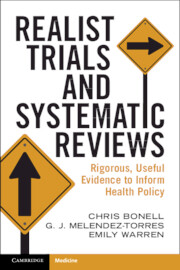Book contents
- Realist Trials and Systematic Reviews
- Reviews
- Realist Trials and Systematic Reviews
- Copyright page
- Contents
- Figures
- Tables
- Boxes
- Acknowledgements
- Chapter 1 Introduction
- Chapter 2 Why Are Trials and Systematic Reviews Necessary but Currently Insufficient to Inform Health Policy?
- Chapter 3 Realist Critiques and Manifesto for Evaluation and Reviews
- Chapter 4 Building Realist Theory in Evaluations
- Chapter 5 Refining Realist Theory through Process Evaluations
- Chapter 6 Testing Realist Theory through Trials or Other Evaluation Designs
- Chapter 7 Building and Refining Realist Theory in Systematic Reviews
- Chapter 8 Testing Realist Theory through Synthesising Outcome Evaluations
- Chapter 9 Using Evidence to Inform Intervention Scale-Up and Transfer
- Chapter 10 Using Evidence to Refine Middle Range Theory
- Conclusion
- References
- Index
Chapter 6 - Testing Realist Theory through Trials or Other Evaluation Designs
Published online by Cambridge University Press: 08 February 2024
- Realist Trials and Systematic Reviews
- Reviews
- Realist Trials and Systematic Reviews
- Copyright page
- Contents
- Figures
- Tables
- Boxes
- Acknowledgements
- Chapter 1 Introduction
- Chapter 2 Why Are Trials and Systematic Reviews Necessary but Currently Insufficient to Inform Health Policy?
- Chapter 3 Realist Critiques and Manifesto for Evaluation and Reviews
- Chapter 4 Building Realist Theory in Evaluations
- Chapter 5 Refining Realist Theory through Process Evaluations
- Chapter 6 Testing Realist Theory through Trials or Other Evaluation Designs
- Chapter 7 Building and Refining Realist Theory in Systematic Reviews
- Chapter 8 Testing Realist Theory through Synthesising Outcome Evaluations
- Chapter 9 Using Evidence to Inform Intervention Scale-Up and Transfer
- Chapter 10 Using Evidence to Refine Middle Range Theory
- Conclusion
- References
- Index
Summary
Once context–mechanism–outcome configurations (CMOCs) have been refined through qualitative research, they can be tested using quantitative data. A variety of different analyses can be used to assess the validity of CMOCs. Overall, analyses will not assess CMOCs but are nonetheless still useful in determining overall effects. Mediation analyses assess whether any intervention effect on an outcome is explained by intervention effects on intermediate outcomes, and so can shed light on mechanisms. Moderation analyses see how intervention effects vary between subgroups defined in terms of baseline context (settings or populations) and so shed light on contextual differences. Moderated mediation analyses assess whether mediation is apparent in some context but not others, and so can shed light on which mechanisms appear to generate outcomes in which contexts. Qualitative comparative analyses can examine whether more complex combinations of markers of context and mechanism co-occur with markers of outcome. Together, this set of analyses can provide nuanced and rigorous information on which CMOCs appear most usefully to explain how intervention mechanisms interact with context to generate outcomes.
Keywords
- Type
- Chapter
- Information
- Realist Trials and Systematic ReviewsRigorous, Useful Evidence to Inform Health Policy, pp. 51 - 65Publisher: Cambridge University PressPrint publication year: 2024

